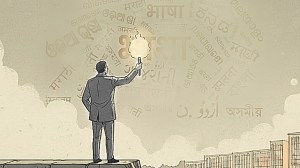My dear students | You may not like authority but might still need it
"Remember the dilution of authority does not only affect the teacher-student relationship but has seeped into every area of our lives," writes Nigam Nuggehalli.
 The idea of predictability is distinct from the idea of certainty. (Graphics by Abhishek Mitra)
The idea of predictability is distinct from the idea of certainty. (Graphics by Abhishek Mitra) (My dear students’, a fortnightly column that is a conversation with young minds on current events, books, popular culture — just about anything that’s worth talking over a cup of coffee.)
Today, I want to talk to you about authority. Why you might not like it and why you might still need it. I am one of those authorities that you meet regularly. Many years ago, I was a student just like you, and now find myself in the unusual situation of exercising power over you. I think you call it power. I call it an exercise in futility. One thing I have learnt with your generation is that the old ideas of hierarchy, power and authority are passé.
Just yesterday I noticed a student texting furiously on his mobile in front of his classroom. ‘Are you a student of the course that’s being taught in this classroom’, I asked politely. ‘Yes’, he said, equally politely, but without any anxiety whatsoever. ‘Are you not supposed to be in the classroom’, I asked. ‘Yes’, he replied, ‘but the authorities have asked me to be in an online meeting’. I wondered briefly if I should introduce myself as an authority but thought the better of it. I never found out if the authorities, whoever they might be, had asked him to a meeting, but I was quite impressed with the fact that he wasn’t all too impressed with my authority, or whatever was left of it.
If I want you to do something, I have to appeal to the merits of what I am asking you to do and hope you concur with me. For the most part, I am not able to make you do something because ‘I told you so’. Contrary to what you might think, I don’t mind this generational shift at all. I think my generation tilted too much towards ‘I told you so’ and it’s good to do things because it is good to do so. I understand that. But sometimes I wish you listened to me only because I am asking you to do something. Many years later, when you have a teenager in the house, you will wish for the consolations of authority.
Remember the dilution of authority does not only affect the teacher-student relationship but has seeped into every area of our lives. The media has lost its authority over us already. In India, there is no single news source that can conduct an investigation that would be considered as authoritative by all sections of the society. This is as far as news goes but the dilution of authority has moved on to other areas. I used to think that science is authoritative but now there are climate change deniers including a former US President, and what is climate change denial but a denial of scientific authority?
But we need authority in our lives. The great philosophers Hobbes and Locke thought that without authority civilised society simply will not exist. Broadly speaking, one of the most important things about authority, of whatever kind, religious, political or academic, is that it is critical to the maintenance of order. This might look very simplistic, but the way people interact with each other will be unrecognisable if there is no authority in our midst, and by that I mean broadly three things, some of which you might already be aware of in a kind of subconscious way, and some of which you might think of as surprising.
The first is certainty. While we want our lives to be determined by a set of rules, everybody has their own opinion on what those principles could be. We depend on authorities to make matters more certain. It’s the job of the authorities to identify with certainty, the rules of the game.
The other aspect of authority is predictability. We depend on authorities to make our lives more predictable. We need a durable identification of the activities that would be considered legitimate, some way of ensuring that in any domain, people indulge in only legitimate activities on a continuing basis, and some way of adjudication and enforcement when people do not act legitimately. This kind of regulation can be undertaken only by authorities.
The idea of predictability is distinct from the idea of certainty. Certainty is about committing ourselves to a clear common standard. But when I am talking about predictability, I am talking about a situation where if I am undertaking some activity, I should be able to say that if I do something X, it will in most cases have certain Y consequences. It might sound mundane, but it’s actually an extraordinarily difficult thing to achieve. Unless processes are put in place that enable the creation of rules, the supervision of rule based behaviour and the adjudication of rule based behaviour, there is no possibility of a durable social life.
Now I will talk about a third related function of authority, which I think you might find surprising. This is candour. Authorities have the unfortunate task of providing the subjects of their authority with a transparent, candid presentation of the inevitable conflicting values in human affairs and the resolutions proposed to such conflicts. There will be trade offs. If we had all the time and all the money and all the people in the world, then we’ll be able to solve all the problems. We don’t have all those things and that’s why we have trade offs. Authorities take a call on trade offs and make those trade offs transparent.
So today spare a thought for all the authorities that you must contend with-parents, bosses, bureaucrats, and politicians. They might be annoying but they are also necessary.
- 01
- 02
- 03
- 04
- 05































